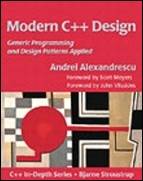| I l@ve RuBoard |
|
 |
|
| • | Table of Contents |
| Modern C++ Design: Generic Programming and Design Patterns Applied | ||
| By Andrei Alexandrescu | ||
| Publisher | : Addison Wesley | |
| Pub Date | : February 01, 2001 | |
| ISBN | : 0-201-70431-5 | |
| Pages | : 352 | |
Modern C++ Design is an important book. Fundamentally, it demonstrates 'generic patterns' or 'pattern templates' as a powerful new way of creating extensible designs in C++--a new way to combine templates and patterns that you may never have dreamt was possible, but is. If your work involves C++ design and coding, you should read this book. Highly recommended.-Herb Sutter
What's left to say about C++ that hasn't already been said? Plenty, it turns out.-From the Foreword by John Vlissides
In Modern C++ Design, Andrei Alexandrescu opens new vistas for C++ programmers. Displaying extraordinary creativity and programming virtuosity, Alexandrescu offers a cutting-edge approach to design that unites design patterns, generic programming, and C++, enabling programmers to achieve expressive, flexible, and highly reusable code.
This book introduces the concept of generic components-reusable design templates that produce boilerplate code for compiler consumption-all within C++. Generic components enable an easier and more seamless transition from design to application code, generate code that better expresses the original design intention, and support the reuse of design structures with minimal recoding.
The author describes the specific C++ techniques and features that are used in building generic components and goes on to implement industrial strength generic components for real-world applications. Recurring issues that C++ developers face in their day-to-day activity are discussed in depth and implemented in a generic way. These include:
Policy-based design for flexibility
Partial template specialization
Typelists-powerful type manipulation structures
Patterns such as Visitor, Singleton, Command, and Factories
Multi-method engines
For each generic component, the book presents the fundamental problems and design options, and finally implements a generic solution.
In addition, an accompanying Web site, http://www.awl.com/cseng/titles/0-201-70431-5, makes the code implementations available for the generic components in the book and provides a free, downloadable C++ library, called Loki, created by the author. Loki provides out-of-the-box functionality for virtually any C++ project.
| I l@ve RuBoard |
|